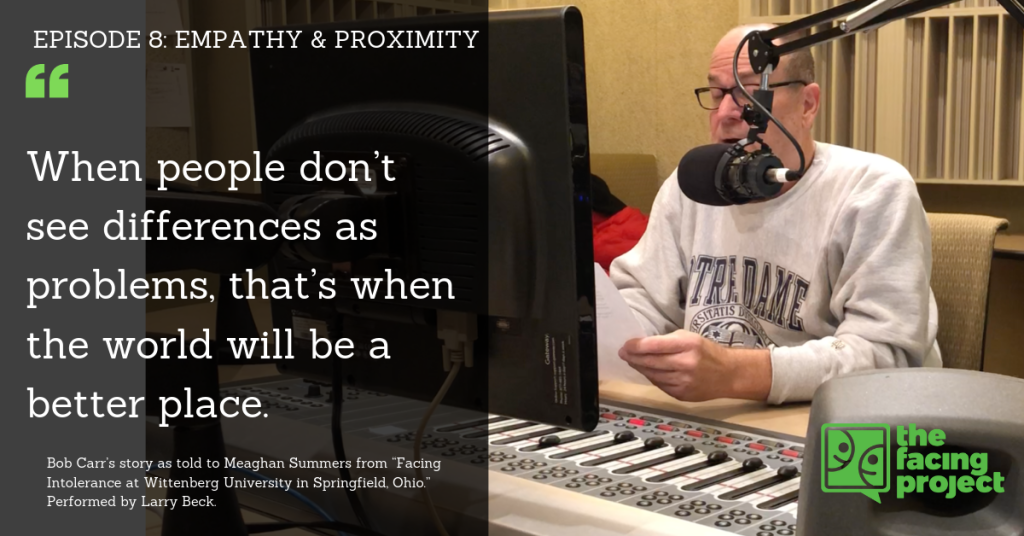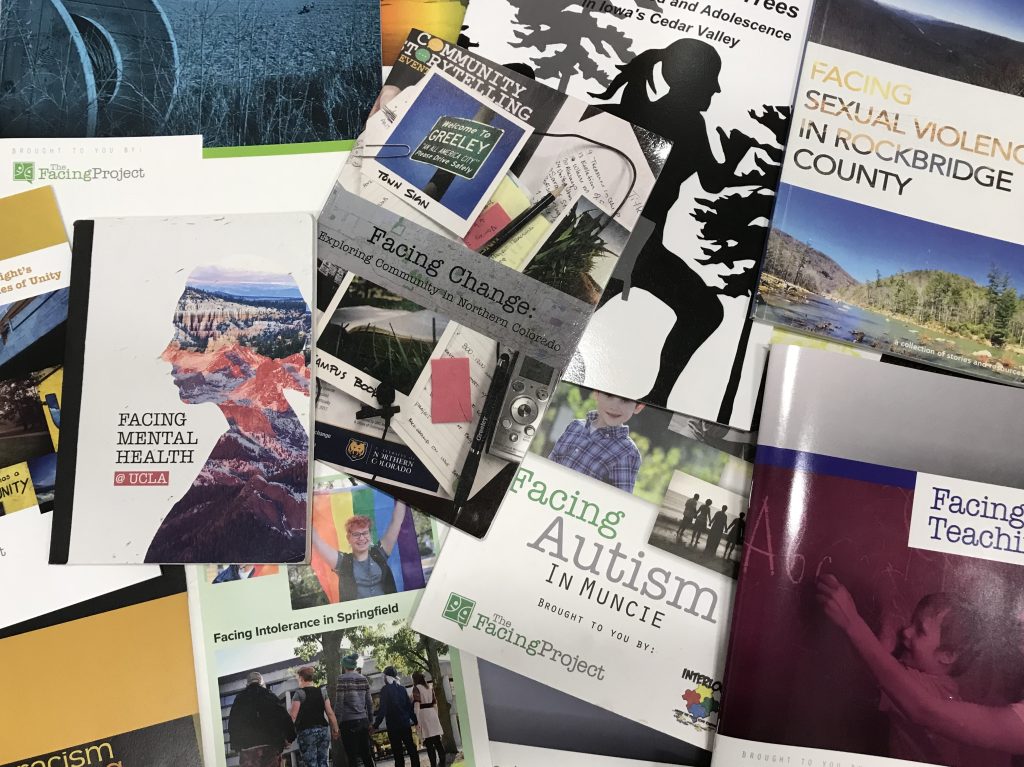Diversity makes our communities stronger, more colorful, more interesting, more adaptable places to live. But to fully appreciate those who are different than us, we have to be near them.
Are you spending time with people who are different than you?
The theme of Episode 8 of The Facing Project Show is “Empathy and Proximity.” Sometimes we may want to connect with someone who is different than us, but be afraid we might say or do something stupid.
It is our hope that these stories–one of a mother who asks you to see her amazing autistic daughter through her eyes, and another of a gay man who stands up for himself and ultimately others–will inspire you to take the first step to better understand and empathize with those who are different than you.
As Bob Carr shares in his story: When people don’t see differences as problems, that’s when the world will be a better place.
(You can read the rest of Bob’s story below).
Want to talk about it? Join our Facebook Group where we talk about podcast episodes, discuss stories and issues, and take action as a community. If you or someone you know needs help, scroll down to the Get Help section at the end of this post.
Stand Up
Bob Carr’s story as told to Meaghan Summers from The Facing Project at Wittenberg University in Springfield, Ohio – Performed by Larry Beck
I remember how I came out to my brother. I invited him to accompany me to a bar in town. I think I secretly wished he’d say no.
“Don’t be surprised,” I said.
Men surrounded us, and it didn’t take him long to discover that I was at home with them, the flamboyant and proud, the bright and shiny members of a community even they, themselves, knew was vulnerable.
He gave me a questioning look, and I nodded.
I watched the bartender pour two shots for a couple with button-up shirts and glasses. Both of them wore pink and plaid with pride and flaunted their engagement rings. I never understood why they would still come to a bar after they met someone.
My brother cleared his throat. “Tell me, are you or aren’t you?”
I nodded again.
He hugged me.
“How long have you known?” I asked.
“You’re asking like I don’t know you,” he said.
We left it at that, and everything was okay until our mother found out.
I had thought my mom’s eyes would pop out of her skull. “What will God think?!”
I hadn’t prepared any answers. I hadn’t considered all of the back-up I would need in case she decided to chuck a Bible at my head. I’d only accepted the invitation because I thought it would involve a sandwich and some coffee—not an exorcism and some holy water.
“I’m sure he already knows,” I finally said. I peered across the kitchen table and rubbed my fingertips along its grooves and dents.
This is where I slammed my sippy cup down when my mom wouldn’t give me a brownie, and that’s where I tried to carve my name when I was 10 and thought knives were cool.
I wanted to jump into the table as if it were a well and get trapped among its history. I wanted to go back to the times when my mother consoled me instead of chastised me. Anything besides this.
“Who all knows?” she asked. I didn’t answer. “Who knows?!”
“I haven’t told anyone else,” I said. The truth is my brother’s wife blabbed to my mom. That made it worse.
“You’re lying to me!” She flung open the Bible and pointed at a highlighted section. “God doesn’t like liars.”
I stared at my thumbs, waiting for the end of the verse. When she was done, I stood up and grabbed my coat.
“Did you hear me?” She reached for my arm. “We need to address this.”
I moved my arm away from hers. “I’m not listening to this.”
“You need to talk to God or else you’re going to Hell!” She was panicking at that point, hoping she could scare me into submission.
She called every one of our relatives, asking them if they knew I was gay. She’d thought she was the last to know. I guess she felt betrayed.
She still calls me every now and then to give me the normal spiel about how I’m going to burn in Hell. We don’t have a great relationship anymore.
I came out to the rest of my family later in life, but I’ve known I was gay since I was a teenager . . .
***
“Faggot.” It was some bully from my seventh grade science class, shoving someone’s head inside a locker. He kept repeating that as if it were a magical chant, as if saying that a thousand times would make it less true, less obvious, less threatening. He stopped when the other kid fought back.
“What’s the point?” the kid asked his bully. I found out on Facebook that the bully came out as gay almost 40 years later, but the bullying continued through school.
It was always something.
Something would make me pop my collar up to my ears and thank my lucky stars that I wasn’t a noticeable target. I played my cards right, and no one suspected that I was a piece of derogatory slang or a horny 13-year-old lusting after straight, flaccid dicks. No one bothered me.
I pretended that one penis was enough and convinced myself that girls meant acceptance. If I dated girls, then no one would know.
For a while, I told myself that that was how life was going to be.
I hit on girls while I glanced at boys from across the room.
Eventually, I got married. That was the hardest part of the ruse. I just didn’t know there were other options at the time. We divorced as she found out I was gay.
I got a job, a home, and I raised our daughter. I had custody of her until she was 13, and I think my ex-wife was upset.
She warned our daughter about me—my gayness. She spoke about me as if I had the plague.
“I don’t want you around that kind of company,” she told her.
The funny thing is that her new husband found her in bed with another woman. My daughter left as soon as she found out. She didn’t need that kind of company.
I got fired from my job when my boss discovered I was gay. There was no other reason I could find. No warning. The word spread, and people slowly drifted away from me just as I drifted from the old gay bar scene.
Time passed, and the world began to change.
On my walks, now, I see two men holding hands, and no one comments on it. No one interrupts them, and no one thinks twice about them being there enjoying each other’s company.
That’s so encouraging to see. When people don’t see differences as problems, that’s when the world will be a better place.
People ask me if I stand up for people who are told they’re different. I’m happy to say that I can answer that with a “Yes.” And I always will.
What is The Facing Project?
The Facing Project’s mission is to create a more understanding world through stories that inspire action. Inspired to get involved after reading this story? Here’s how you can help.
DONATE: Your donation will help support storytelling projects around the country. On average a $10 donation helps produce one story like the one you just read, and a donation of $200 can help help us support an entire community project.
GET INVOLVED: Learn how you can start a Facing Project in your community.
VOLUNTEER TO WRITE OR SHARE : Are you ready to share your story? Are you ready to help someone share theirs? It’s easier than ever to contribute to The Facing Project.
JOIN THE CONVERSATION: Share this post with someone who needs to hear the story, and continue the conversation on our Facebook Group, where we discuss each episode of The Facing Project Show.



